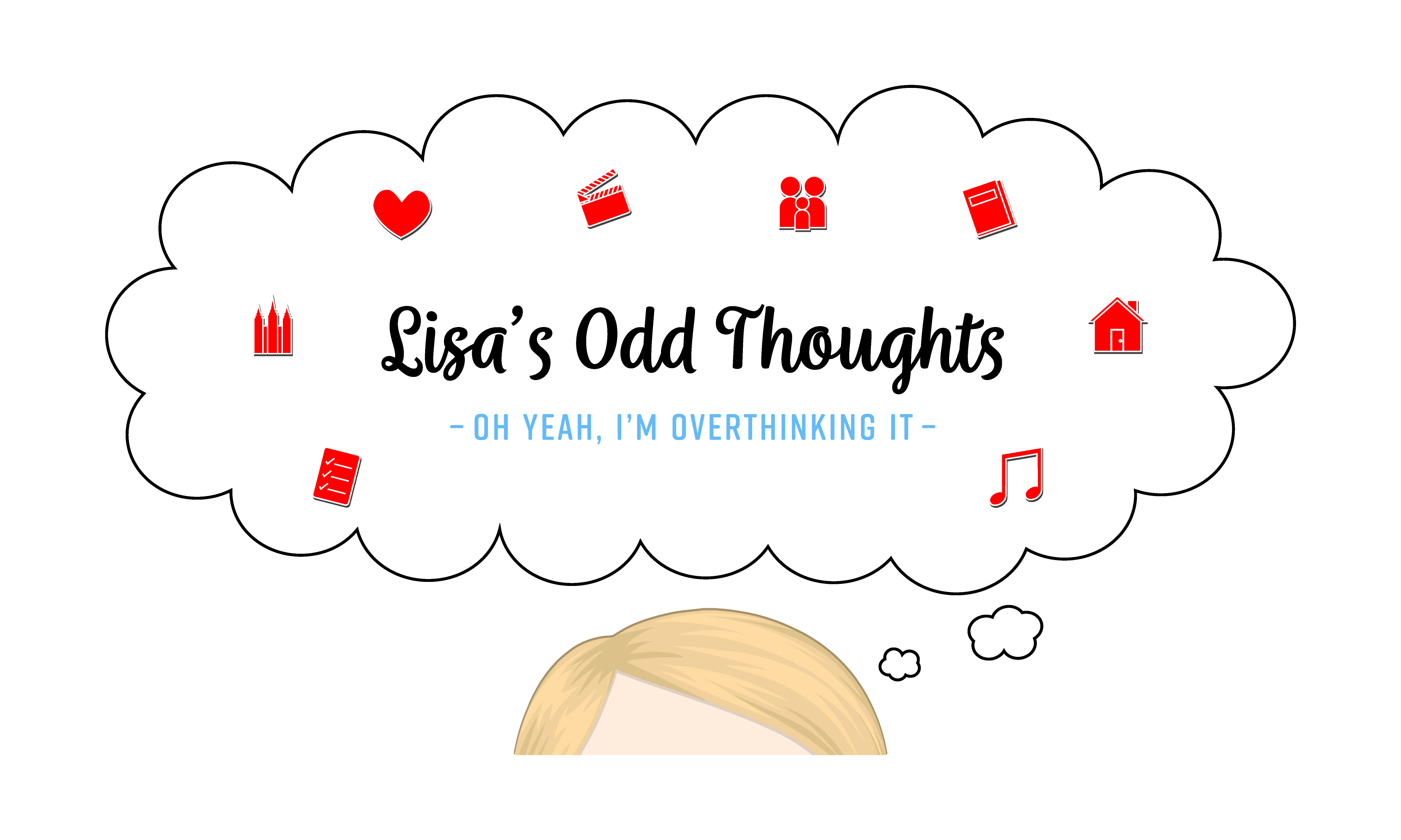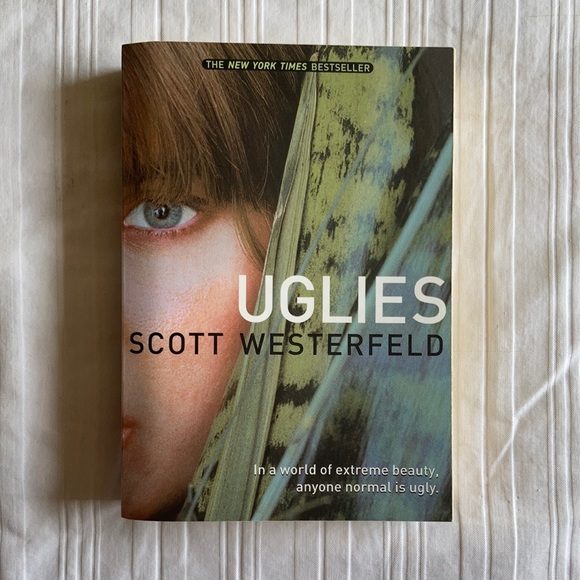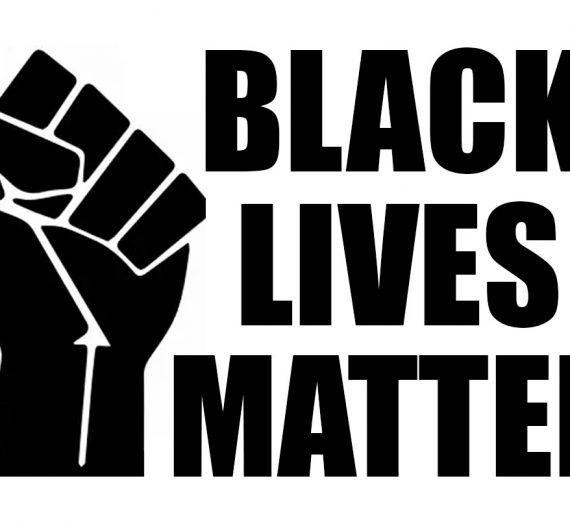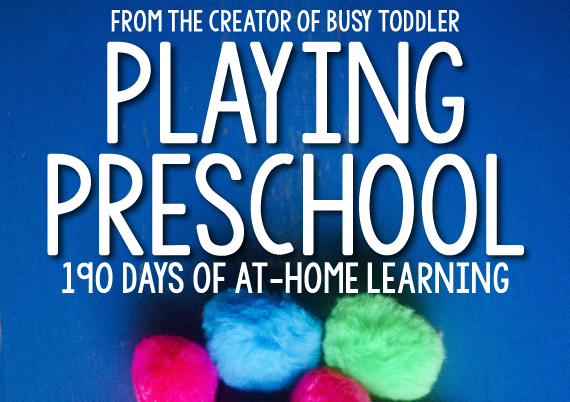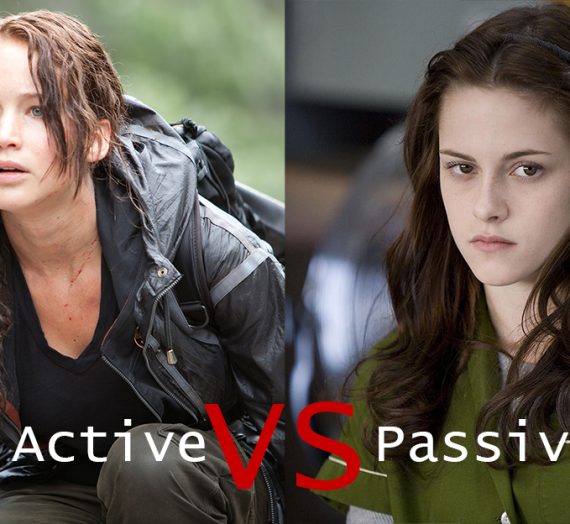When I was in high school my English teacher regularly assigned an extra credit novels, and one semester she assigned Uglies by Scott Westerfeld. I wasn’t normally into dystopian sci-fi novels and this wasn’t a book I would have naturally chosen for myself, but I needed the extra credit.
So my surprise, Uglies hooked me instantly and has remained one of my favorite novels and trilogies ever since. My copy of the book, along with its sequels, Pretties and Specials, has sat on my shelf ever since.
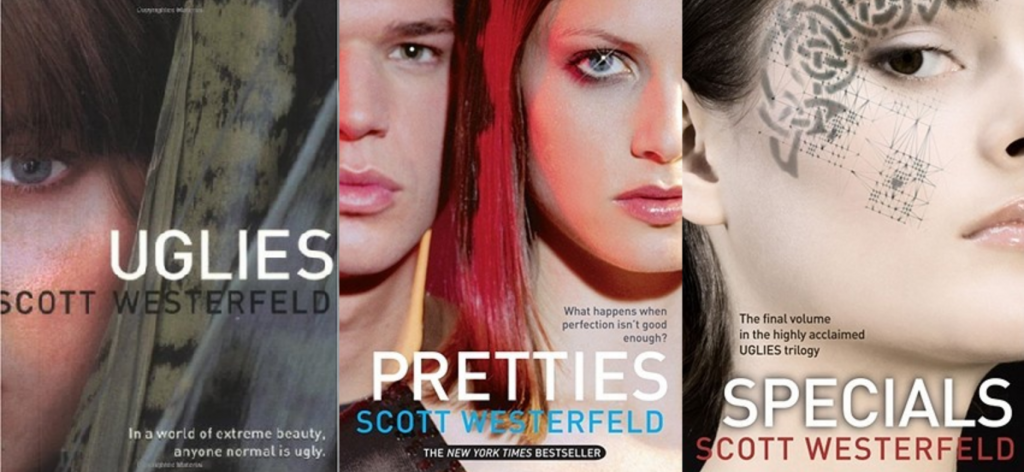
I randomly picked it up again last week. Actually, I was looking through my old books for ones to declutter, and I randomly grabbed my well-loved copy of Uglies with its paper peeling off the spine and the page’s corners soft and worn. I hadn’t read it in over a decade, so I opened it up and began to read.
Just like when I was fifteen years old, I was instantly hooked and I devoured the novel in just a few days. Needless to say, it survived my decluttering purge and went back on my bookshelf.
As a teenager I was more interested in the exciting storyline, but this time, as an adult watching the political disaster that is our current world unfold, this novel struck me as a profound symbol of our present political state, as foreboding and freakishly-accurate as other works like 1984, Brave New World, and Hunger Games.
So let’s dive in and take a look!
Synopsis of Uglies
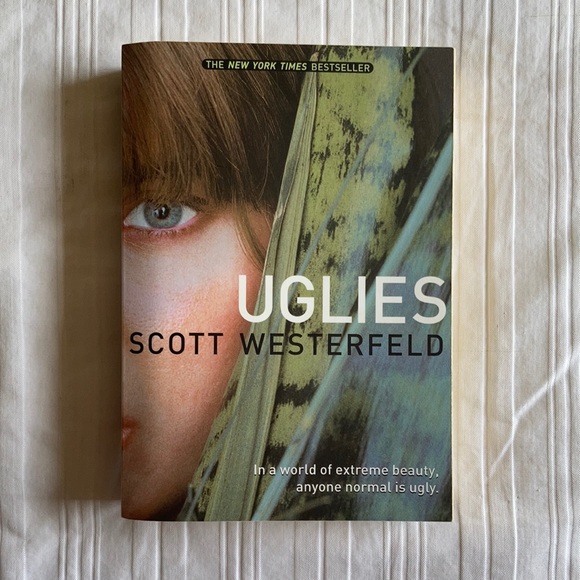
Tally Youngblood, the protagonist, lives in a post-apocalyptic dystopia roughly 300 years in the future. In this world, the government has discovered that all wars and conflicts ultimately spawned from humans not being able to reconcile their physical differences, and so they’ve solved that problem by surgically altering every citizen to become beautiful, or “pretty.” Looking perfect, and perfectly the same as everyone else, has cured the world of its inequalities and conflicts, and so everyone lives in perfect harmony within their isolated cities.
Tally is looking forward to getting her “pretty” surgery, but has to wait until her 16th birthday just like everyone else. Her best friend, Peris, turns 16 before her and moves to New Pretty Town, leaving Tally behind with the other “uglies” still waiting for their operations. Her new loneliness drives her to meet a new ugly friend, Shay. But Shay is different than anyone Tally has ever met before: Shay doesn’t want to become pretty.
Shay finally decides to run away. She tells Tally about a mysterious place out in the wild called the Smoke where people live ugly, but free of the city, and she gives Tally cryptic directions to get there should she change her mind and decide to follow Shay to a life of freedom. And Shay leaves.
Tally waits, alone, for her 16th birthday to come, but on the day of her long-awaited surgery, she instead gets whisked off to the foreboding office of Special Circumstances, a department of frightening, surgically-altered superhumans who look “cruel pretty,” all run by Dr. Cable.
Dr. Cable explains to Tally that Shay (along with her other runaway friends) needs to be rescued from the Smoke and it’s dangerous cult leader, David, and brought back to the city. Tally is given an ultimatum. She must follow Shay’s cryptic directions to get the Smoke, infiltrate the community as a spy, and activate a tracking beacon when she arrives to direct Special Circumstances to the Smoke’s location.
If Tally refuses, then she’ll never get her treasured pretty surgery and she’ll remain ugly for the rest of her life. With so little choice, Tally agrees to become Dr. Cable’s spy.
Tally leaves the safety of her city and endures a dangerous journey through the wilderness. Finally she arrives at the Smoke, the secret community of runaway uglies living and working together free of the city.
There she meets David, the teenage son of the Smoke’s founders, who was raised in the wild. The Smoke at first is a bizarre and backwards place to Tally; they do hard manual labor, kill animals for food, burn wood for fires, barter and pay for resources, and of course remain ugly.
As she lives there, Tally is more drawn to this lifestyle and her eyes open to the tyranny of her home city. She wars with herself about when, and even if, she should activate her tracking device to call Special Circumstances. She’s also romantically drawn to David, as he is to her.
Then Tally meets David’s parents, Az and Maddy, the founders of the Smoke. They used to live and work in the city as surgeons, performing the pretty surgeries on sixteen-year-olds. But they discovered a big secret: the pretty surgery not only changes the outward appearance of the patient, but adds a lesion on the brain that changes the way the patient thinks. The surgery makes people compliant and dumb, stupid citizens who are easy to control. When Az and Maddy found this scary truth, they ran away and formed the Smoke, rescuing young uglies and bringing them here to save them from that fate.
This revelation, plus David’s affection for her, convinces Tally to stay in the Smoke and not betray its location to Dr. Cable. She takes the tracking device from Special Circumstances and throws it into the fire to destroy it. She’s now willing and committed to this new life as an ugly with David.
Unfortunately, she doesn’t know that the tracking device has a failsafe and automatically activates upon being damaged when she throws it into the fire.
Special Circumstances tracks her and arrives the very next morning. They attack the Smoke, destroy the entire community, and take all the runaway uglies as prisoners. Anyone who resists is killed.
Tally, who is horrified by what her accidental betrayal brought about, barely manages to escape with David. Everyone else is either killed or taken back to the city to be forced to undergo the brain-altering pretty surgery.
Determined to put things right after her accidental betrayal, Tally promises to rescue Shay, David’s parents, and the other captured Smokies. She and David return to the city, but too late. David’s father has been killed and Shay has been forcibly turned pretty.
David and Tally manage to rescue the other prisoners, including David’s mother and the now-pretty Shay. They all escape to the ruins on an old city, where they struggle to re-establish the Smoke, sneaking into the city and spreading the truth, recruiting new uglies, hiding from Special Circumstances, and mostly just trying to survive.
David’s mother, during her imprisonment, was able to steal some vital data about the brain lesions and with this new information, develops a potential cure for the brain lesions caused by the operation. But she needs a willing pretty to consent to test this cure.
Shay refuses to experiment on herself, but Tally sees this as a way to pay for her betrayal and try to right her wrongs against her friends. So she agrees to turn herself in, get the pretty operation, and later test Maddy’s experimental cure.
She does exactly that. She leaves David behind and gives herself up to Special Circumstances.
“This City is Paradise”
The most important sentence that sums up the purpose of the cities and the pretty surgery comes from the antagonist Dr. Cable.
When Tally is taken to Special Circumstances and told that she must infiltrate the Smoke, Dr. Cable tells Tally that Shay is part of a dangerous gang that needs to be stopped. It would be doing Shay a favor, going after her and letting Special Circumstances bring her back to turn her pretty.
And then Dr. Cable gives this most important line:
“This city is a paradise, Tally. It feeds you, educates you, keeps you safe. It makes you pretty.” (Uglies p. 106)
Upon an initial reading, this line seems fairly harmless. Tally, in fact, feels a sense of hope at these words, as she’s longed to be turned pretty her entire life.
But after finishing the book and realizing what the Special Circumstances department really is, learning about what the city really offers, and understanding how the pretty surgery damages the brain, this line in hindsight becomes frankly quite terrifying.
Is the city a paradise? Absolutely not. Such is the conclusion that the reader ultimately comes to. The city is a cage and Special Circumstances is the jailer, a very dangerous jailer.
But Dr. Cable is in fact telling the truth. The city does provide those four crucial aspects equally for each of its citizens: “It feeds you, educates you, keeps you safe. It makes you pretty.”
Note the important grammar here. At first it sounds like the last part, “It makes you pretty,” is the fourth item on the list of resources the city offers. But no, it’s not an item on the list.
Notice the commas between the first three items: “It feeds you, educates you, keeps you safe.”
Then a period separates that final thought into an entirely new sentence all on its own. “It makes you pretty.”
Being made pretty isn’t one resource that the city offers, but the summation of all the other resources. It’s not just the surgery, in this case, that makes you pretty, but the other three resources are a key factor in turning people into compliant, stupid, air-headed pretties.
“It feeds you, educates you, keeps you safe. It makes you pretty.”
These three items are exactly what current leftists want in our country: food, education, and safety. They are convinced that if the government supplies these three things, then we will indeed create a paradise, just like Dr. Cable describes.
But don’t forget the last part of that line. Don’t forget that when the government gives you those three things, it also makes you a stupid, obedient “pretty.”
Let’s look at those three things, both in terms of how they are shown in the book and how they are used in the real world: food, education, and safety.
“It Feeds You”
The city, run by Special Circumstances, doesn’t only supply the citizens with food, but with every imaginable material resource besides.
Tally mentions “the hole in the wall” where she can order just about any object she wants, be it clothes, food, or toys.
I imagine these types of machines to be some sort of replicator technology like in Star Trek. Regardless of exactly how it works, it means the same thing: unlimited resources and unlimited energy.
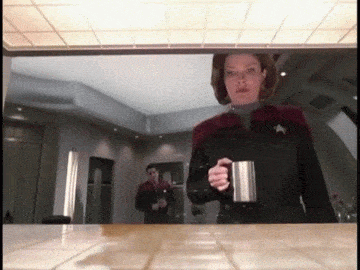
This technology means that no one in the entire city has to ever lift a finger. No one has to get a job. No one has to pay money for rent. No one has to worry about where their next meal will come from. Every material possession they could ever imagine is given to them without question from “the hole in the wall.”
Sounds great, right? Sure, on some degree, sure.
But then Tally gets to the Smoke and things are drastically different. Everyone is required to work to contribute to the community. For the first time ever, Tally has to do hard manual labor that leaves blisters on her hands. But also for the first time ever, she finds that she actually enjoys the hard work and that it gives her a feeling of accomplishment. That feeling is something I call dignity.
Another first for Tally in the Smoke is the concept of bartering. She keeps her dehydrated food packs to trade like currency and for the first time ever recognizes the value of material items.
When David sees the blisters on her hands, he gifts her a pair of leather gloves. Tally immediately understands the weight of such a gift because of the scarcity of resources out there in the wild. It makes his gift that much more meaningful and she appreciates it, and David himself, so much more for his sacrifice.
Not only are the objects themselves more meaningful, but Tally notes that these homemade and hard-earned possessions are actually higher quality than the free, recyclable material from the city. When she first meets David, she notices that his homemade jacket is made from real leather. At first she’s shocked and a little scared; she’s been taught that killing animals is wrong and she hates the idea of wearing animal skins. But as she lives and works in the Smoke, she notes that David’s jacket is thicker, warmer, and higher quality than her thin dorm jacket that she brought with her from the city. He might have had to kill some animals and worked long and hard to make this coat himself, but he is so much better off for it.
Here in our real world, this idea of the government supplying endless resources is a common wish from leftists. They say that housing should be free, internet should be free, healthcare should be free, black people should get reparations, banks should be bailed out, companies need to raise the minimum wage, and more, more, more. More and more TikTok videos are popping up of young leftists bemoaning the fact that they have to work at all, calling the very idea “greedy” and “capitalist.” Even the idea of universal income has been suggested by many as a paradisiacal solve-all for society.

Look, I understand the draw of never having to work again, I really do. It sounds so peaceful and relaxing to just sit back and not have to worry about bills or money or putting food on the table. And I’m absolutely an advocate for helping and lifting people out of poverty. Yes, yes, and yes.
But when the government provides for your every material and physical need, it makes men weak and dependent. He who holds the food controls the population, which is exactly what we see in “Uglies.” After all, citizens can’t fight back against a tyrannical government if they are starving.
But a population who is self-sufficient, independent, and hardworking? Now that is a population of powerful people capable of great things, and a population who knows the strength of their own two hands. That is a population that is hard to control and hard to manipulate. Hard work gives a man dignity and a reason to live.
Let’s also point out this massively important difference between this novel and our real world: They have replicator technology and endless, renewable energy. We do not.
This conversation would be drastically different if we could, like in Star Trek, just walk up to the wall and ask for a hot cup of tea and it would simply appear. Yes, that technology would miraculously end world hunger overnight. It would be incredible. Like in Star Trek, humans truly would be freed from the most base need of every human on earth–hunger–and we’d all be abounding in free time previously spent working for food. It certainly sounds like a kind of paradise to me.
But we don’t have that blessed technology. No food is going to appear out of thin air in your kitchen. As much as you leftist communists think that you deserve to live unemployed and let the government (aka the taxpayer) pay for all your needs and pleasures, in the end you’re always demanding that another human being work to support your piddly existence.
There is a worker at the electrical plant making sure you can turn on your lights. There is a farmer growing the wheat to make your bread. There is a truck driver delivering the food to your grocery store. There is an IT worker making sure your internet connection works. There is a plumber keeping your toilet flushing. There is a water plant employee purifying your water. There is a seamstress sewing your shirts. There is a landscaper weeding your lawn. There is a barber cutting your hair. There is a doctor giving you checkups. And there is a mommy making you a sandwich while you play video games in her basement.
All these people, these humans, are working their tails off. Do you think that they want to? Don’t you think they’d rather be at home relaxing and being with their families and watching stupid Netflix shows? Of course! Or do you think that in your communist utopia they would go to work in the fields and factories and stores purely out of a desire to serve your entitled butt? I don’t think so.
What you’re asking for is slavery, which is ultimately the very worst aspect of leftist ideology. You’re asking for everyone else to slave away, to pay the taxes and grow the food and build the houses, to cater to you, their slave master. It’s not only the most selfish mentality I’ve ever heard, but it’s incredibly evil.
In the book, we see a brief comparison of Tally’s two male love interests, Peris and David. Peris is Tally’s lifelong best friend, but is only seen in a single scene of the book, when Tally sneaks into New Pretty Town to visit him shortly after he’s received the pretty operation. She isn’t necessarily in love with her childhood friend, but she does mention that she’s daydreamed a bit about being with him once she’s also pretty. But when she sees him, he isn’t the Peris she remembers. He’s of course very pretty, but also annoyed with her for bothering him. He’s dressed up for a fancy party and is upset when Tally accidentally gets mud on his clothes. He’s just a shallow, pretty face with no regard for his best friend, despite the promises of forever friendship he made to her. Otherwise he has no personality, no humanity, and no purpose for living. He only exists to party like a new pretty, which he does.
David, on the other hand, is used to hard manual labor. He’s used to killing his own food and making his own clothes. He’s used to a hard life, and Tally immediately notes that he is strong, capable, and very mature. And oh boy does she like that! David is mountains more attractive than Peris for his humanness and his ruggedness, even though he’s an ugly while Peris is a pretty. David is very serious and understands the dangers and realities of life, where Peris gets all huffy about some mud on his clothes.
Peris is the kind of man that the city produces, the kind of man who never had to work a day in his life and who had everything handed to him from a magical hole in the wall: he’s weak and shallow.
David is the kind of man that the wild produces: he’s strong, serious, and very masculine. It’s no wonder that Tally picks David over Peris. The choice is obvious.
“It Educates You”
Like the physical resources, the city also provides free education for all of its citizens. The novel doesn’t outline an exact curriculum that the city teaches, but we see enough breadcrumbs of evidence throughout the novel to guess as to what type of education Tally, Shay, Peris, and the other uglies have received.
Tally talks a lot about how scientific and biological the pretty operation is. Being pretty is a mathematical equation, she’s been taught, and it’s all about symmetrical features, healthy skin, and big eyes. The experts have cracked the code and scientifically defined beauty, so therefore the surgery must be morally good–it’s backed by science after all! And Tally certainly trusts those experts.
Tally, of course, also learns the truth about the pretty operation, that it’s not true. Being pretty hasn’t solved the world’s problems, but only made a stupid and obedient population. Further, David himself tells Tally that she’s beautiful–a major shock to her. But it’s proof that you don’t need a math-based operation to be beautiful. People like David can see not only Tally’s physical appearance, but her personality and her strength, and that is also part of her beauty. You can’t measure that kind of beauty with science. The city’s education is wrong.
Further, they speak often about the old civilization they call The Rusties (which is us, the modern-day reader), named for all the rusted metal and cars that they left behind in their ruined cities. Tally regularly refers to these Rusties as backward, crazy, and harmful to each other to their environment. While all of those accusations are partly true, it’s clear that her own city uses the Rusties as an example of why staying in the city and becoming pretty is so important–anything to avoid being like those horrible Rusties! The school takes a yearly fieldtrip to the nearest ruins of a Rusty city to show the children how the Rusties destroyed themselves, which serves as a good reminder to stay in their peaceful “paradise” back home and not end up like those stupid Rusties.
But eventually Tally learns the truth about the Rusties, that they weren’t all barbaric environment-destroying crazies. She and David find old ruins of wind generators and she’s genuinely surprised at this evidence of the Rusties’ intelligence, ingenuity, and concern for taking care of the planet.
The city only and always framed their history as the Rusties being stupid, barbaric, and pathetic. Their education, Tally learns, is wrong.
Eventually Tally also learns from David the truth about what destroyed the Rusty civilization: an “oil plague” that caused all the oil to explode, which destroyed essentially every aspect of their society.
But why? She asks David. Why would the city lie about what really happened to the Rusties?
David has the answer: the Rusties’ downfall happened because of their overdependence on one thing: oil. The current cities don’t want to teach that solely relying on a single thing, or in this case, a single idea, could be your downfall. That single, toxic, society-destroying idea is clearly the government using the pretty operation as a form of control over their population.
So yes, the city educates its citizens, and for free, sure evidence that this is indeed a “paradise” like Dr. Cable says. But their education is a twisted and censored version of history, one that paints the Rusties as barbaric idiots and themselves as glorious heroes who have saved the world via the pretty operation.
The nail in the coffin of the city’s corrupt education is shown in some good ol’ classic book burning. When Tally first arrives at the Smoke, Shay shows her the library where they’ve preserved 300-year-old magazines. Tally is both disgusted and intrigued at the huge variety of faces, both ugly and beautiful, shown in the old pictures of models, movie stars, celebrities, and politicians. She’s never seen anything like it before, even with all their talk about the Rusties. She realizes that humanity used to exist despite being ugly, contrary to all her lessons about the Rusties being crazed maniacs.
Later, when Special Circumstances arrives and attacks the Smoke, they burn down the entire compound but make a special point to leave the books and magazine inside the library to also be burned. Tally is horrified when she and David discover what’s happened, but David tells her that of course Special Circumstances would want to erase all evidence contrary to their ideology, that the pretty operation is the one and only, most desirable solution to all of humanity’s problems.
That’s a government education for you.
Return to our present day. We’ve relied on government-run public schools for decades, and what results are we seeing? Reading and math scores are tanking, students are groomed to be Marxist activists, creepy teachers are giving sexually explicit gender ideology lessons, history is being rewritten to portray the US as evil, and teachers are leaving the profession in droves because of the toxic environment.
That’s just the tip of the iceberg, but it’s all on my personal list of reasons I’ve chosen to homeschool my own kids.
Colleges and universities are, if possible, even worse. Just like in elementary schools, higher education is teaching young adults a twisted, censored version of history, capitalism, communism, and biology. And leftists keep pushing for free college; do you honestly think more government input will make these universities any better?
There is a quote often tossed around the homeschool community that says this: “We cannot continue to send our children to Caesar for their education and be surprised when they come home as Romans.”
If you ask Julius Caesar to educate you, he’ll teach you that the Roman Empire is greater than God. If you ask Tally’s city to educate you, then they’ll teach you that the Rusties were barbaric and the pretty operation has saved the world. If you ask our current government to educate you, they’ll teach you that the US needs to be destroyed, communism is compassionate, your parents are the bad guys, and men can get pregnant.
That’s quite the education.
“It Keeps You Safe”
By far the biggest contrast between Tally’s city and the Smoke is that the city is “safe” and out in the wild is dangerous.
In the city, they have bungee jackets that catch you if you fall or jump off a building. The fireworks don’t actually burn anything and automatically shut off if they hit the ground. Tally and Shay wear magnetic crash bracelets to catch them if they fall off their hoverboards. They have med-spray to instantly heal any cuts or bruises. Over and over and over, both Tally and the author note how safe the city is.
However, they also show that the city is fake. The fancy buildings and party towers are built bigger at the top than the bottom and Tally notes that without the support of “hoverstruts” then they would all collapse.
Later, when Shay and Tally take their hoverboards out of the city to go hoverboarding in the Rusty Ruins, they have to walk through a stretch of forest with no metal and therefore no magnetic field to fly their magnetic hoverboards over. As they are carrying their boards, Tally notes that she never knew how heavy her hoverboard is, to which Shay responds that everywhere in the city is magnetized and so the hoverboards always have that lift so they feel lighter–but that lighter weight is fake. It’s a lie, a safe little lie.
But the moment Tally leaves the city, nothing at all is safe. When Shay convinces her to leave the city at night for the very first time and go see the Rusty Ruins, Shay takes her to an old roller coaster. As their hoverboards are magnetic, they use the ancient metal tracks to coast at high speeds, loving the thrill of it all. But then, surprise! Shay doesn’t tell Tally that part of the track is missing, and Tally faces death when she rockets off into open space, unsupported and freefalling. Luckily her momentum carries her forward to the next track where her hoverboard can fly again, but it’s her first brush with death…her first, but not her last.
On her journey through the wild to the Smoke, Tally nears dies multiple times, such as when she nearly hoverboards off the side of a cliff and later when she gets caught in a controlled wildfire. Even the Smoke itself isn’t safe with its burning fires, mining metal for making hoverboard trails, and constantly worrying about being discovered by Special Circumstances. When Special Circumstances does arrive and attacks the Smoke, Tally escapes on a hoverboard, but without grippy shoes or crash bracelets; in her mad and dangerous dash to escape, she is very aware that any fall off her hoverboard will kill her.
But what’s so wrong with the city being safe? I hear you ask. Isn’t safety a good thing?
In general, I’d answer that of course safety is important. Especially as a parent, I’m hyper aware of my children’s safety when we are walking through crowded parking lots, climbing on tall playsets, cooking together at the hot stove, or simply driving in the car. I would never suggest that anyone take stupid risks that could get themselves seriously hurt.
But at the same time, I also know that absolute safety is impossible to achieve. Just like the fake buildings in New Pretty Town, safety is an illusion, something we tell ourselves to comfort us against the very real dangers of the world. We wear seatbelts to make us a little safer, but we still risk a deadly car accident every time we get behind the wheel. Life is a dangerous risk, and no matter how hard you try, you can never be 100% safe from all things at all times.
So what? I still hear you ask. Isn’t it good that the city is at least trying to make its citizens safer?
So I ask you: what do they pay for that “safety”?
The citizens of Tally’s city aren’t allowed to leave. Their government enforces “population control” measures. They are lied to about history in order to keep them stupid. The citizens don’t even raise their own children, who are taken from them at the age of 12 to go live in the dorms with only some occasional visits (Tally’s parents make one very brief appearance in the entire series, even though they are alive and well and living in her same city; it’s obvious that she’s hardly bothered by their absence because their influence on her life is so minimal).
Most sinister of all, the government constantly brainwashes everyone into thinking that getting the pretty operation is the greatest, most noble, and most desirable thing in the world, even though it’s a tool to oppress them. And when push comes to shove, Dr. Cable shows that she has no problem using the pretty operation as a manipulation tool to control and torment Tally, whose brainwashing has taught her to desire that oppressive surgery above all else.
The city has zero freedom. That’s what the citizens gave up in the name of safety.
But at least they’re safe, right?
The real-world comparisons are frighteningly accurate. After the 9-11 attacks over twenty years ago, the administration passed the Patriot Act, promising that it would keep Americans “safe” from terrorism, and the American people were thrilled. Instead, that act just gave the government the power to spy on its citizens and control them. We’re not any safer from terrorism, but we have a lot less freedom and the government has a lot more power.

During the recent Covid pandemic, the American (and world) population was all too eager to give up their freedoms again in the name of “safety.” The government shut down schools and banned church attendance. They made curfews and ticketed or arrested people for being out of their homes. They forcibly shut down any businesses that didn’t comply with their strict mandates. They put useless masks on the children (but couldn’t bother with masks for themselves) and told everyone that it was for our “safety.” To me, the scariest part is that most people lapped it right up and bowed down without question; anything for that fleeting sensation of “safety.”
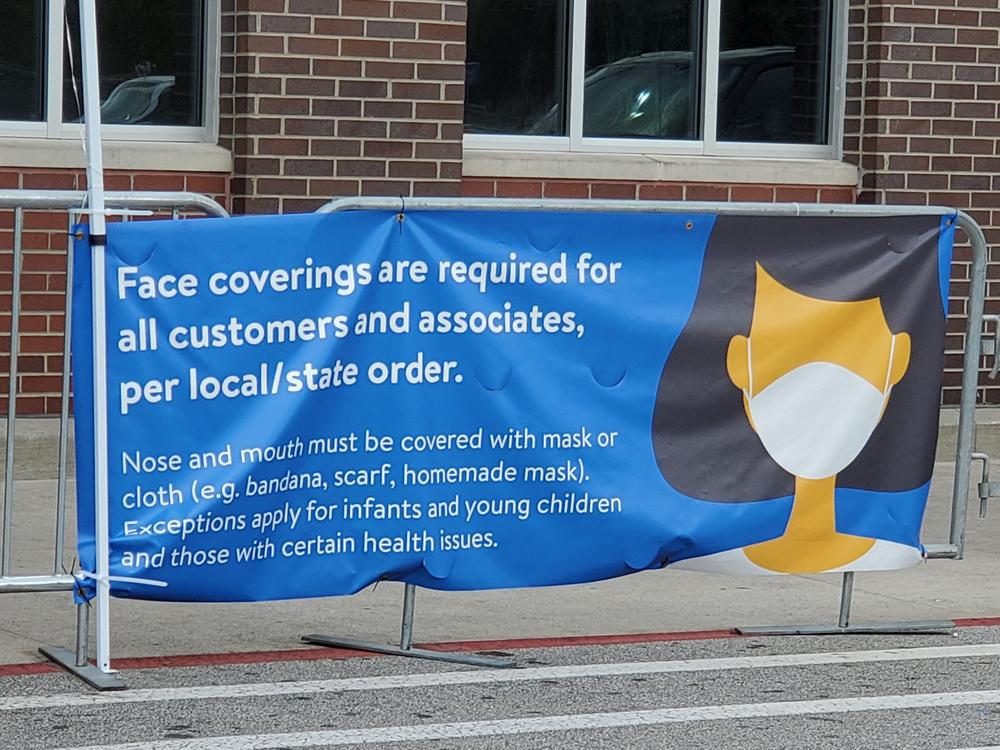
That’s the kind of paradise Dr. Cable would have loved.
“It Makes You Pretty.”
Being pretty is all Tally ever wanted. It was what all of the citizens were taught and conditioned to want.
But what does becoming pretty actually mean?
Tally is shocked and horrified when David’s parents reveal the big secret to her: the pretty operation causes intentional brain damage, the kind of brain damage that keeps a person from thinking freely. It makes a person soft, obedient, trusting, and most of all stupid.
David’s parents know that this brain damage is both intentional and reversible, because they found that people who took on jobs that required higher brain use suspiciously had their brain lesions removed; doctors, teachers, rangers who make controlled fires out in the wild, and Special Circumstances officers. The dumbing-down lesions are clearly intentional for subduing the general population.
The pretty operation is the ultimate tool in keeping a tyrannical grip over a stupid population. And it works brilliantly.
“Becoming pretty doesn’t just change the way you look,” [Tally] said.
“No,” David said. “It changes the way you think.” (Uglies p. 268)
In the book, this operation and brain lesion is a very real, tangible and physical thing. But here in the real world, the symbolism is a lot more metaphorical.
The government is not surgically altering your brain, but they are certainly trying to alter it with their toxic ideas–men can get pregnant, math is racist, traditional families are bad, killing human babies in the womb is beautiful, and the government can save us from climate change.
These ideas are stupid, plain and simple. You’d have to have stupid-causing brain lesions in order to believe them, and yet a certain portion of the population does indeed believe in these absurd imaginary notions.
Who? Who believes this nonsense?
It’s the leftists who also believe that the government should feed us, educate us, and keep us safe. They are, for lack of a better word, brain-damaged.
Remember Dr. Cable’s infamous line: “This city is a paradise, Tally. It feeds you, educates you, keeps you safe. It makes you pretty.”
Becoming pretty, remember, isn’t another item on the list of things the city provides; it’s the summation of the list. When you receive free food, federal education, and mandated safety from the government, “it makes you pretty.” It makes you stupid.
So this is my message to the leftists out there calling for more government power, more government programs, and more government money to swoop in and give you a communist “paradise”: Just remember what sort of person that paradise will make you:
It makes you “pretty,” and that’s about the ugliest thing you could ever be.
